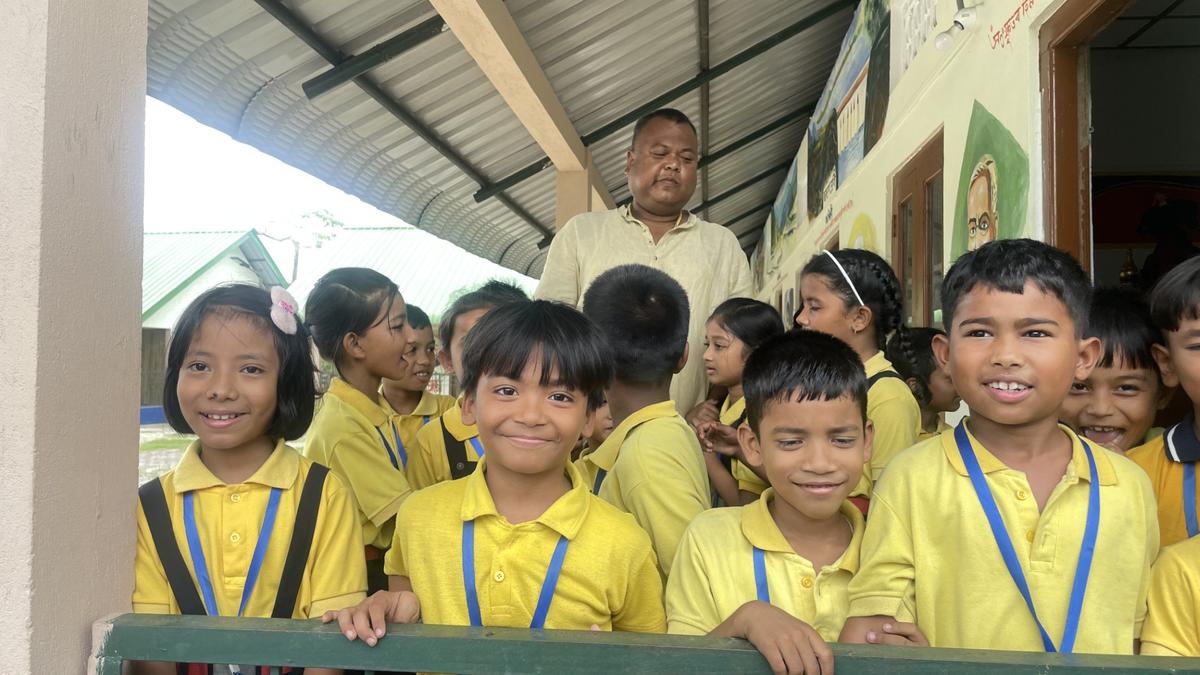Protap Saikia, the secretary of a trust that runs the no-fee Jyoti Protap Gyanmarg Bidyalay, with students. Photo: Special Arrangement
Self-employed Nabajyoti Barua has been trying to eliminate swear words from his vocabulary lest his four-year-old son picks them up. He has also cut down on his ‘adda’ (chatting sessions with friends) to devote more time to his son’s studies at home in Sivasagar district’s Jhanji Baruagaon village.
Home-maker Purabi Dutta of Kaliapani village in the adjoining Jorhat district has been focussing on managing her anger and exuding positivity to keep her daughter, a little more than three years old, cheerful at home.
Their effort is to ensure that their wards studying at the Jyoti Protap Gyanmarg Bidyalay earn 20 non-academic marks in each subject to score at least 60% in the annual exams to be promoted to a higher class.
The school covering more than two acres is on National Highway 127 at Kaliapani, a village about 330 kms east of Guwahati and on the eastern edge of the Jorhat district.
Mr. Barua and Ms. Dutta know that their wards – admitted to the nursery class in April – have to meet the school’s condition of scoring at least 60% marks to be retained when they get promoted to class one. “Habits take time to change. So, we have started now to be ready when the time comes,” Ms. Dutta said.
Biju Kumar Sarmah, the coordinator of the school, defended the condition set by the Jyoti Protap Education Trust for spending ₹30-lakh annually on free education, books, uniforms, meals, vocational training, and life skills apart from providing access to digital learning, robotics, and most other facilities offered by high-end urban schools at a premium.
The trust is named after local businessman Protap Saikia and his deceased wife Jyoti Saikia. It is funded by a large chunk of the earnings from Mr. Saikia’s businesses and investments in insurance policies.
“We understand each student is different and they could be under pressure to attain the minimum marks but we prepare them in an environment of fun to be able to confidently absorb it without realising it. The condition is more for parents to imbibe human values in their children and ensure they play, study, and be self-sufficient,” he told The Hindu.
Only five of the State Board-affiliated school’s 210 students were found to be lagging but they were eventually promoted after extra classes and some grace marks.
Super 30 model
“Rural children are generally more resilient than their urban counterparts but they lack access to opportunities and confidence to face a highly competitive world beyond their comfort zone. Unfortunately, we are in a rat race, and we want our children to withstand the challenges later in life by setting a goal now – 60% in their case,” Mr. Saikia, the trust’s secretary, said.
He insisted that the goal is attainable without much sweat as 10% is based on extracurricular activities and discipline of a child and 10% on good parenting. “Ultimately, the parents are responsible for this 20% added to each subject of 100 marks with the students required to answer questions for 80 marks,” he said.
Mr. Saikia and his associates studied the best educational practices around the globe before establishing Jyoti Protap Gyanmarg Bidyalay in 2021. If schools in Japan gave the idea of letting children keep their classes clean, tend to potted plants – each child has one in his or her name in the school – and learn skills such as producing vermicompost, the Super 30 model decided the maximum number of students to be admitted per class.
“Although the norm is 40 students per teacher, we have capped the number of students at 30 per class. Our standard would be followed when we gradually upgrade to class 12 from class five now,” Mr. Saikia said.
“The school caters to children from various backgrounds living within a radius of 30 kms. I want them to excel academically because I could not as circumstances forced me to earn a living at 11 years,” he said.
The Super 30 model is envisaged to extend to students who can return as successful adults to continue running the school charitably for “children of the future after I am gone”, Mr. Saikia said.
Wait and earn
The school has a fairly comfortable waiting zone for parents who come from afar to drop off their children and wait to take them back home after classes. The zone is equipped with a monitor where they can see how their children are taught and what they do in class.
“We have noticed most parents spend four to five hours sitting, chatting, or pacing around. We have decided to equip the waiting zone with a loom, tools for various kinds of work, and a mini food processing unit so they can be productive according to their abilities,” Mr. Saikia said.
“But producing cloth, pickles, jellies, or any handicraft item is meaningless without market linkage. We are also lining up buyers so the parents can earn as they wait,” he said.



